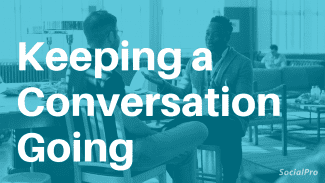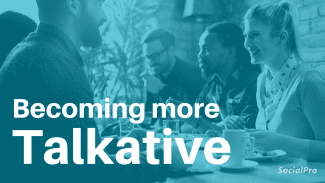Are you an introvert who struggles to initiate a conversation? Do you feel lost or bored when you try to make small talk? Perhaps you run out of things to say or get so stuck in your head that social situations get awkward.
As an introvert myself, I’ve never been fond of small talk or high energy group conversations. Over the years, I’ve learned strategies for how to be a good conversationalist.
If you want conversation tips for introverts, this guide is for you. You’ll both learn how to start a conversation as an introvert and keep it going.
Remind yourself that small talk serves a purpose
“I don’t like small talk and get annoyed if someone tries to have a shallow conversation with me. Why don’t people want to discuss something meaningful?”
Small talk, for introverts, is often an energy-sapping chore. But small talk is the first step to making friends. It shows that you understand the basic rules of social interaction and puts people at ease.
Don’t assume that someone is boring just because they make small talk. You might have some interests in common, but if you aren’t willing to start off with small talk, you’ll never know. You may discover that they love having deep conversations.
Prepare some conversation starters
If you tend to go blank in social situations, memorize some conversation starters.
Good conversation starters for introverts:
A remark about your surroundings
Example: “This place looks so much better since they repainted it, right?”
A request for help or advice
Example: “There are so many smoothies on this menu, I’m finding it hard to choose! Do you have any recommendations?”
Asking a question about an unusual accessory
Example: “Oh, I like your t-shirt! I’m guessing you’re a [Band Name] fan?”
A sincere compliment
Example: “I really enjoyed the presentation you gave last week.” Compliment something they have done, not their appearance or personality.
Practice and memorize a few conversation starters for different social situations, such as a party or in the breakroom at work.
This guide on how to start a conversation will give you some more ideas.
Move from small talk to deeper conversations
IRF stands for Inquire, Relate, and Follow up. This technique encourages richer conversations because it helps you share something about yourself as you get to know the other person.
For example:
You: Did you do anything fun over the weekend? [Small talk]
Them: Yeah, I took my kids camping.
You: Cool. Is that a regular thing you do as a family? [Inquire]
Them: We try to take trips and mini-vacations every couple of months if we can.
You: My parents used to take my brother and me out hiking when they could. [Relate]
You: What’s your dream outdoor vacation? Where would you love to go? [Follow up]
Them: I’d love to visit the Rockies! I really want to see the… [keeps on talking about the Rockies]
You can repeat the IFR loop as many times as you like.
Mix closed and open questions
You might have read that closed questions are always bad. This isn’t true. Although open-ended questions are more likely to lead to an interesting conversation because they ask the other person to give more details, you can’t avoid Yes/No questions altogether.
As a general rule, try not to ask two Yes/No questions in succession.
Give yourself permission to say what you are thinking
As an introvert, you might be more self-aware than the typical extrovert.[1] You might feel self-conscious about sharing your thoughts because you’re worried about saying something stupid.
Compared to extroverts, introverts are also more sensitive to negative feedback, which can make them reluctant to say what they think and feel.[2]
Practice sharing your opinions. Disclosing your thoughts and feelings builds intimacy, which is key for building relationships. Occasionally you might say something that sounds silly, but everyone else will soon forget about it. You might feel as though everyone cares about your social blunders and will judge you harshly for them, but this is an illusion.[3]
Share small vulnerabilities
If you’ve become comfortable sharing your thoughts and feelings, you can go slightly further by sharing an insecurity if it’s relevant to the conversation. Doing this can make you more relatable. It also encourages the other person to open up, which can make the conversation more personal.
For example:
- “I always doubt myself before a job interview.”
- “I like going to the gym, but I get a bit self-conscious working out in front of others.”
You’ll need to judge the situation carefully because revealing too much can make people uncomfortable. It’s usually best to avoid talking about intimate relationship problems, medical topics, and anything to do with religion or politics until you know the other person better.
What’s the point of sharing about myself, and why would anyone care?
Sharing about yourself makes others feel comfortable opening up, too. To form a close relationship with someone, you’ll have to gradually open up to each other.[13]
It’s not true that people only want to talk about themselves. They also want to get to know the person they’re talking to.
Slowly push yourself beyond your comfort zone
Introversion is not the same as social anxiety. However, compared to extroverts, introverts are more likely to have social anxiety disorder (SAD).[4] You can take a screening test for SAD online.
If you have SAD, try gradual exposure therapy. You can make a list of social situations that cause you anxiety, and rank them in order from least to most difficult. This is called a fear ladder. By working your way slowly up the ladder, you’ll become more confident talking to people.
For example, “Saying ‘Hi’ to the barista in my favorite coffee shop” might be the first step on your ladder, followed by “Saying “Hi” to a coworker and asking them how their day is going.”
We strongly encourage you to also seek professional support from a therapist experienced in exposure therapy.
We recommend BetterHelp for online therapy, since they offer unlimited messaging and a weekly session, and are cheaper than going to a therapist's office.
Their plans start at $64 per week. If you use this link, you get 20% off your first month at BetterHelp + a $50 coupon valid for any SocialSelf course: Click here to learn more about BetterHelp.
(To receive your $50 SocialSelf coupon, sign up with our link. Then, email BetterHelp’s order confirmation to us to receive your personal code. You can use this code for any of our courses.)
This article on how to make friends when you have social anxiety contains more practical advice.
Take action even when you feel shy
Not all introverts are shy, but research shows that introversion and shyness are related.[5]
Unlike SAD, shyness is a personality trait, not a disorder. It’s also a feeling. Like other feelings, you can acknowledge it without letting it control you. For example, although your work might make you feel bored, you probably get it done anyway. The same principle applies to shyness and making conversation.
Around 50% of American adults say they are shy, but it’s only obvious in 15-20% of cases.[6]
You can be shy and socially successful, even if you secretly feel self-conscious.[6] Accept that you feel nervous, then decide that you’ll talk to people anyway. Remember, your anxiety probably isn’t as obvious as you think.[7]
Shifting your mindset will help you keep a conversation going as an introvert.
Bring out your extroverted side
“How can I improve my introvert personality? Is there any way to make myself extroverted?”
There’s nothing wrong with being an introvert, and you don’t have to change your personality to have better conversations with other people.
However, acting more extroverted can have benefits. Research shows that when you act extroverted, strangers will respond more positively toward you.[8] Acting extroverted can also improve your mood.[9]
Here are some tips:
- Be more open to trying new things. If a friend suggests something you wouldn’t normally try, don’t dismiss it.
- Dare to be friendly to other people first, even if you aren’t sure whether they like you.
- When you have an idea or suggestion, share it with people instead of weighing the pros and cons first.
- Express your emotions verbally and nonverbally. Allow yourself to gesture more often and don’t inhibit your facial expressions.
You will be more successful if you set behavioral goals[10] such as, “I will initiate a conversation with three people this week” or “I will smile at one stranger every day.”
Another way to appear more extroverted is to raise your energy level. Read this guide on how to be a high-energy person socially if you’re low-energy.
Learn how to take part in group conversations
As an introvert, you might find conversations difficult to follow because you need to keep track of several people and monitor their reactions. However, there’s a simple trick you can use when you want to make a contribution. Just before you speak, inhale and make a gesture, such as raising your hand by a few inches. Done right, this movement will grab people’s attention, and you can then start speaking.
When someone else is speaking, use your body language to make it clear you are still part of the conversation. Make eye contact with the speaker and nod occasionally to show that you are listening. Keep your body language open; try to avoid crossing your arms or legs, as this may make you appear closed off from the group.
Find people who are on your wavelength
There isn’t a standard list of conversation topics for introverts that works for everyone.
Making conversation is usually easier if you and the other person have something in common. Seek out groups and places for people who share your interests and hobbies. Try Eventbrite, Meetup, or look for Facebook groups that advertise events in your area. Check out your local community college for classes.
Go to regular meetups instead of one-off events. That way, you won’t have to make small talk with strangers every week. Instead, you’ll gradually get to know people over time and have increasingly deeper conversations.
25-40% of American adults identify as introverts.[11] If you go to a few events, it won’t be long before you find someone with a similar social style.
Practice your natural curiosity
Introverts are typically more easily distracted than extroverts[11] and more likely to zone out during conversations.[12] This may be because the situation feels too overwhelming or because they tend to become lost in their own thoughts.
To stay focused, ask yourself questions about the other person. Try not to think about what you’re going to say next or what they are thinking about you. Reframe the conversation as a chance to get to know a fellow human being. This strategy also makes it easier to come up with questions.
For example, if someone mentions that they have been busy lately because they’ve closed a deal on a house, you might ask yourself:
- Where did they live before?
- What do they like most about their new area?
- Did they move for any special reason, like a new job?
Take breaks when you feel your energy levels drop
When you arrive at an event, find the quiet places you can escape to for a few minutes if you need a break. This could be a bathroom, a patio, or a balcony.
Give yourself permission to leave an event when you start to feel tired. There’s no need to force yourself to stay until the end if you are drained.
Team up with a more extroverted friend
Relying on someone else as a safety blanket isn’t a good long-term strategy, but asking an extroverted friend to come with you to a social event can make it easier to start conversations.
You can also play off each other’s strengths. For example, your friend might be very confident and enjoy talking to strangers, whereas you might be better at asking thoughtful questions. Choose a friend who understands why introverts hate small talk and who is happy to steer conversations in a more meaningful direction.
Read some books on conversation skills
If you find it hard to talk to people because you get anxious in social situations, these books may help:
This book wasn’t written as a guide on how to be a good conversationalist for introverts, but it contains a lot of practical advice on talking to others when you feel shy. It also shows you how to turn acquaintances into friends.
2. How To Communicate With Confidence by Mike Bechtle
This guide is aimed at people of all personality types and teaches you how to make conversation in any situation.
3. The Introvert’s Guide to Success in Business and Leadership by Lisa Petrilli
This book explains how introverts can network and succeed in professional environments. It contains practical strategies on how to use your personality type to your advantage.
See our rankings for the best books on social skills.


















I am an introvert. However, I know that I love people. I know that when I was growing up, my mother was very talkative and outgoing. I think she worried about me, because she thought I didn’t talk enough. I started understanding that she probably just did not have an understanding about being introverted. Also, I see that my being an attentive listener is a strength in me and it helps me learn more about others.